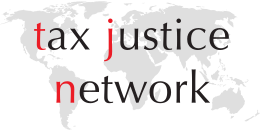Tax Justice Network
The Tax Justice Network (or TJN) is an advocacy group consisting of a coalition of researchers and activists with a shared concern about tax avoidance, tax competition, and tax havens.[2]
 | |
| Abbreviation | TJN |
|---|---|
| Formation | March 2003 formal November 2002 informal |
| Founder | 28 co-founders[1] |
| Founded at | London |
| Type | NGO |
| Focus | tax avoidance, tax competition, tax evasion, and tax havens. |
| Headquarters | 38 Stanley Avenue, Chesham, Buckinghamshire, HP5 2JG, United Kingdom. |
Official language | English |
Chairman | John Christensen |
Chief Executive | Alex Cobham |
Revenue (2016) | £1,111,981 ($1,556,773) |
| Website | www |
| Taxation |
|---|
 |
| An aspect of fiscal policy |
Foundation and growth
TJN grew out thanks to the process of the global social forum and the international movement of ATTAC. TJN is a multilingual, non-partisan, non-governmental, plural and diverse network. From 2003 to 2013 it was structured as a coalition, with both organisational members (such as social movements and national, regional and local civil society) and individual members (such as activists for justice in taxes, researchers, journalists, development specialists, trade unionists, and professionals of taxation, politicians and officials). Since 2013, when the Global Alliance for Tax Justice was set up to coordinate organisations working for tax justice around the world, TJN has been structured as an independent research and advocacy organisation.[3]
Civil society is progressively committing itself to the issues of capital flight, tax evasion and tax fraud and competition, which are generally seen as obstacles to the mobilization of national resources in developing countries. In June 2000, one of the main NGOs dedicated to development published a report titled Tax Havens: “Unlocking the hidden billions to eradicate poverty”. The creation of the Tax Justice Network was in part a consequence of the publication of that report. In the United States, the Citizens for Tax Justice Organization has undertaken a similar effort, although with a national focus. On the contrary, TJN focuses primarily on the international level.
Since 2000, ATTAC, which was born in France in support of the called Tobin tax, has become a movement of international pressure that faces the problems of tax fraud, financial crime and the abuse of tax havens. In April 2005, ATTAC-Spain asked the Government not to recognize the fictitious and instrumental companies registered in tax havens before the Spanish legal system. And ATTAC-Germany played a decisive role in the creation of Tax Justice Network, whose diffusion is spreading in the Spanish-speaking countries.
Until recently, international fiscal policy was hardly a field for civil campaigns, as can be demonstrated by an example. In June 2003, the G8 meeting in Evian summoned 300,000 demonstrators in Geneva, 3,000 people registered to pressure the delegates and Geneva came to a standstill. In December 2003 the UN Committee of Fiscal Experts met in Geneva and TJN was the only civil society organization that attended and intervened in the meeting.
Empirical results
In March 2005, TJN published the results of an investigation that demonstrated $11.5 trillion of the personal wealth of wealthy individuals held in offshore financial centers. In addition, to minimize taxes or to avoid paying them, a large proportion of this wealth is managed in about 70 tax havens. If the income from this wealth patrimony will pay the taxes in the countries where these rich individuals reside or where they obtain their wealth, the additional tax collection available for the financing of public services and for investment in the whole world would be around 255,000 million of annual dollars. We emphasize that this estimate of the loss of tax revenues does not include the tax evasion of transnational corporations or the reduction of tax revenues caused by tax competition.[4]
The TJN has reported on the OECD Base erosion and profit shifting (BEPS) projects and conducted their own research that the scale of corporate taxes being avoided by multinationals is an estimated $660bn in 2012 (a quarter of US multinationals’ gross profits), which is equivalent to 0.9% of World GDP.[5][6]
In July 2012, following a study into wealthy individuals with offshore accounts, the Tax Justice Network published claims regarding deposits worth at least $21 trillion (£13 trillion), potentially even $32 trillion, in secretive tax havens. As a result, governments suffer a lack of income taxes of up to $280 billion.[7][8][9]
In November 2020, the TJN published "The State of Tax Justice 2020" report. It claims $427 billion is lost every year to tax abuse.[10][11]
Focus
Financial Secrecy Index
The Financial Secrecy Index is a biennial publication of the TJN which was started in 2009 and was last released in February 2020.[12] It covers 133 global jurisdictions and produces a "Secrecy Indicator" score for each based on 20 qualitative criteria. Releases are widely covered in the media.[13][14][15][16]
Corporate Tax Haven Index
The Corporate Tax Haven Index is a biennial publication of the TJN which had its inaugural publication in May 2019.[17] It covers 64 global jurisdictions and produces a “Corporate Tax Haven Index” value by combining two core measures; first a Haven Score based on 20 mostly tax related criteria, second a Global Scale Weight showing the scale of activity. Release are widely covered in the media.[18][19][20]
Funding
TJN has been rated as 'highly transparent' in its funding by Transparify[21] and has been a given a A grade for funding transparency by Who Funds You?[22]
Other
Experts of TJN appeared at public hearings of the Finance Committee of the German Bundestag in 2016.[23]
See also
Notes
- "Happy Birthday Tax Justice Network". TJN. 9 November 2012.
- "Core Funding Prospectus 2018–2021" (PDF). Tax Justice Network. 2018. Retrieved 24 March 2019.
- Alex Cobham (11 November 2016). "Tax Justice Network: A transition". Tax Justice Network. Retrieved 24 March 2019.
- "The Price of Offshore" (PDF). Tax Justice Network. 2018.
- "Tax Avoidance Costing U.S. $189 Billion: Tax Justice Network". Bloomberg News. 23 March 2017.
- "Base Erosion and Profit Shifting BEPS". Tax Justice Network. 2015.
- "13 trillion pounds in offshore tax havens: Report". The Times of India. 22 July 2012. Retrieved 22 July 2012.
- "Super rich hold $32 trillion in offshore havens". Reuters. 22 July 2012. Retrieved 22 July 2012.
- "Tax havens: Super-rich 'hiding' at least $21tn". BBC. 22 July 2012. Retrieved 22 July 2012.
- "The State of Tax Justice 2020" (PDF). Tax Justice Network. 20 November 2020.
- "$427bn a year lost to tax abuse by firms and rich individuals, study finds". The Guardian. 20 November 2020.
- "Financial Secrecy Index 2020 Results". Tax Justice Network. 18 February 2020.
- "Report Says U.S. Is World's Second-Biggest Tax Haven". Bloomberg News. 30 January 2018.
- "U.S. Becomes World's Second-Biggest Tax Haven". Wall Street Journal. 30 January 2018.
- "UN urged to launch global effort to end offshore tax evasion". The Guardian. 30 January 2018.
- "Australia a safe haven for illicit funds, but Switzerland the world's worst". Sydney Morning Herald. 31 January 2018.
- "Corporate Tax Haven Index 2019 Results". Tax Justice Network. 28 May 2019.
- "UK and territories are 'greatest enabler' of tax avoidance, study says". The Guardian. 28 May 2019.
- "Channel Islands 'among worst tax havens' worldwide". BBC. 28 May 2019.
- "U.K. Islands Unravel Global Corporate Tax Order, Group Says". Bloomberg Tax. 28 May 2019.
- "Round-Up of Transparify 2018 Ratings". Transparify. Retrieved 7 July 2019.
- "Tax Justice Network | Who Funds You?". whofundsyou.org. Retrieved 7 July 2019.
- "Öffentliche Sitzung des Finanzausschusses" (in German). German Bundestag. 15 June 2016. Retrieved 16 February 2017.
External links
- Tax Justice Network
- Global Tax Alliance for Justice
- Briefing Paper of the TJN
- TJN Co-founder Richard Murphy Tax Blog
- Bullough, Oliver. "The Fall of Jersey: How a Tax Haven Goes Bust," The Guardian online, 8 December 2015 - includes an interview with John Christensen, a native of Jersey, about the origins of TJN